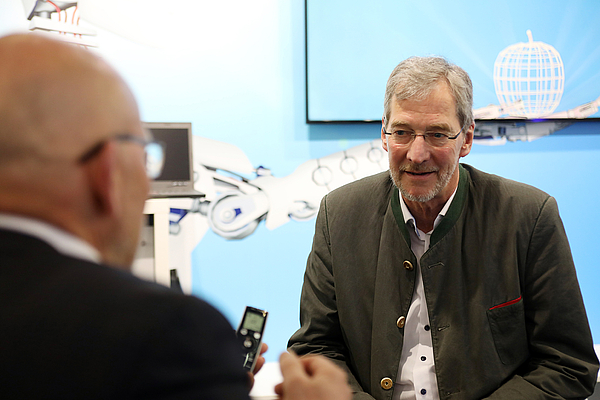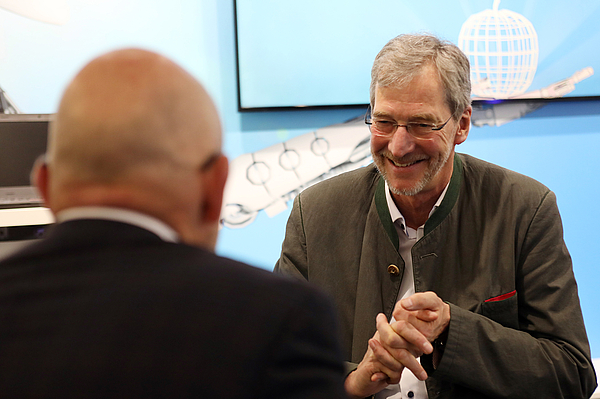
|
|
Last year, the shareholders of PROSTEP AG appointed Hans-Josef Nagel to the Supervisory Board. In his role as a member of the board, he wants to go beyond a purely supervisory role and make an active contribution to the strategy discussions, based on his many years of experience at SMEs and in manufacturing industry. In our interview, he sheds light on what is important when it comes to IT projects at SMEs. 
Question: Mr. Nagel, what appeals to you about being on PROSTEP AG's Supervisory Board? Nagel: As a member of the Supervisory Board, my primary role, as the name suggests, is supervisory. But at my very first meeting with PROSTEP I explained that I wanted to go beyond reviewing figures and contracts and make a concrete contribution and be involved in discussions about the company's strategy. The chairman of the Supervisory Board, Dr. Heinz-Gerd Lehnhoff, whom I know from previous projects at General Motors, proposed me for this position primarily because of my experience at SMEs. Question: Where did you first start working with SMEs? Nagel: At the very beginning of my professional career, I worked for a small consultancy in Berlin that dealt with IT systems for SMEs. There, we developed a concept for an integrated approach that combines the rolling out of software with the simultaneous improvement of operational processes and qualification of the employees involved. This ensures that the new software drives the development of the company forward. We called this "benefit-oriented IT rollout". I've applied this approach to all my industrial projects. Benefits can only be realized if change is achieved in the processes and the way employees work. Question: And after that, at HighQ-IT, you were mainly concerned with implementing SAP in the automotive industry. Is that right? Nagel: To start with, we developed a lot of custom software. We then became implementation partner to IBM and Baan and later to SAP. After R/3 came onto the market, we were involved in an increasing number of SAP implementation projects and ultimately became SAP's Special Expertise Partner for Automotive and PLM. Half of our customers were OEMs and half were major SMEs, so I'm familiar with both worlds. However, the OEM business has become increasingly difficult since López because car manufacturers have started to hire larger partners and outsource support for their IT installations. Our 100 consultants and 30 to 40 freelancers meant that we were no longer able to cope with projects of this magnitude. As a result, we sold the manufacturing division of HighQ-IT to the American systems integrator Perot Systems in 2008. Question: Based on your experience, what shape would you say PROSTEP is in? Nagel: First of all, I have to say that PROSTEP is very well positioned. The company is well managed, has a reasonable equity cushion and has a good market position thanks to the way it is integrated in projects for the OEMs. In this respect, everything would appear to be in order from the perspective of the Supervisory Board. But I do see room for improvement when it comes to profitability. Pressure on hourly rates has continued to increase in the OEM business in recent years, which means that an equivalent contribution margin can only be achieved by means of high capacity utilization. Consequently, I believe that broadening business and expanding the customer base are correct and important steps. Question: What type of customers do you consider particularly attractive in this context? Nagel: When I talk about broadening business, I'm thinking of larger SMEs where PROSTEP has the opportunity to become involved in the discussion of problems and solutions at an early stage, to play a role in designing the concepts for the solutions and to derive appropriate projects from them. In this sector, we have considerably more room to be proactive in shaping things and the full scope of our consulting and solutions offering can be brought to bear. This results in an entirely different basis of calculation, especially if you can design the solutions around your own products. Question: In your opinion, what are PROSTEP's strengths? Nagel: Its field of business and expertise mean that PROSTEP is well prepared for what we will be facing in the coming years as a result of digitalization. Digitalization requires greater openness, flexibility and variability of data streams over the Internet. The integration of a wide variety of different IT systems and end devices not only gets the product into production or shipment digitally but must also support comprehensive end-user care. Standardization, security, documentation and data protection are prerequisites for such comprehensive digital processes. These are all key issues that the company has been dealing with for years. Question: How can PROSTEP better exploit these strengths at SMEs? Nagel: PROSTEP can already boast success in a broader arena. The company's solutions have earned it a leading position among shipping companies. In other markets, PROSTEP is not yet quite as far advanced. The reason for this may be historical, as its OEM business led it to focus on the acquisition and execution of clearly defined projects. When working with SMEs, you have to "dig in" with the customer by positioning yourself as a competent partner when it comes to addressing innovation-related issues. The project manager's horizon and scope of action must extend well beyond the defined content of the assignment. Even as the current project is being executed, action needs to be taken to initiate and prepare follow-on projects. Question: Do IT projects at SMEs require a different approach? Nagel: They demand a different sales approach and also a different kind of project management. Project managers mustn’t simply see themselves as solution architects but instead need a holistic view of things. They need to understand the customer's goals, business case and processes, as well as the way in which the people involved think and act. I believe that many people at PROSTEP have mastered this holistic approach. They may need to apply it a little more consistently and always give thought to where else they can help the customer. Question: Isn’t it true that SMEs often prefer IT solutions from a single source and may also need help in implementing Industry 4.0? Nagel: The world will change because companies who can supply everything from a single source will no longer exist. Openness is a basic prerequisite for coping with the complexity of Industry 4.0 because the IT functions now extend from the cloud to mobile phones through to programmable controllers. Not even the biggest IT providers can offer the expertise needed for this level of penetration from a single source. Everyone must be willing and able to work in teams brought together from different companies and organizations and, where necessary, manage heterogeneous teams of this kind. The ability to work together in the interest of the customer with a minimum of conflict is particularly important for SMEs as they don't have the capacity to manage heterogeneous teams themselves. Question: So would you rather expand the partner network than build up additional skills? Nagel: I believe that PROSTEP should stay close to its core competencies and invest only very selectively in additional skills. For example, you don't necessarily need SAP expertise yourself; you just need to know where you can get it. It's important to have competent partners that you can trust and treat as equals, even if the client is often responsible for choosing those partners. You don't always need a general contractor. It is also possible for the partners to bear the responsibility towards the customer jointly, each for their own area of expertise. Mr. Nagel, thank you very much for talking to me. (The interview was conducted by Michael Wendenburg) 
About Hans-Josef Nagel Until 2009, Hans-Josef Nagel (62) was a managing partner at the Munich-based SAP consultancy HighQ-IT for the manufacturing industry GmbH and is now an independent consultant for processes and systems. Born in Saarlouis, Germany, Nagel studied industrial engineering at the Technical University of Berlin, focusing on software engineering and production engineering. After graduation, he first worked as a software engineer at sd&m Softwaredesign und Management in Munich and then became Head of Software and Processes at Thiede & Thiede Mittelständische Systemberatung in Berlin. In 1989, he joined up with a Berlin-based software company to found CONDAT Informationssysteme für die Industrie, which subsequently became HighQ-IT. Nagel was named a member of the Supervisory Board of PROSTEP AG last year. |
|
| © PROSTEP AG | ALL RIGHTS RESERVED | IMPRESSUM | DATENSCHUTZERKLÄRUNG | HIER KÖNNEN SIE DEN NEWSLETTER ABBESTELLEN. |

